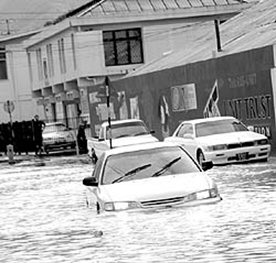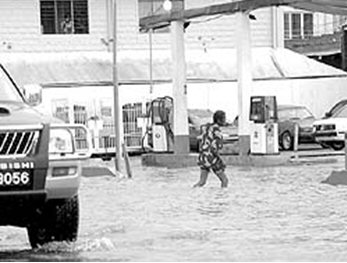| Our Planning System - Part 3
Published
Thursday 23rd September 2004

Our drainage system is clearly inadequate as lower French
Street, Woodbrook, becomes a virtual pool after one hour of
continuous rainfall. |

A pedestrian tries to reach the NP service station on
Wrightson Road, Port-of-Spain after mid-afternoon showers on
Friday. |
|
Photos: David Wears |
This week we conclude our look at our
planning system and its impact on property values here. The practice of
planning involves researching the past and selecting acceptable forms of
development and land use.
When we consider that permission to
develop one’s property is a valuable legal right, we can see that
planning is an exercise in the allocation of a scarce resource.
That resource is the development right.
The allocation of these can have effects in several ways.
The first of these ways is that the
proposed development/s could have an effect on the existing land users
by changing their amenity, privacy or exclusivity.
Another consideration is that every
development—housing, commercial, offices or industrial—we permit today
inevitably reduces the land area and options for future generations.
As we stated earlier in the series,
proper land-use planning requires that a balance be struck between
competing stakeholders—those who have already developed, those who want
to develop now and of course, those who are not yet here with us.
Next week we consider the lessons of the
Queen’s Park Savannah.
Long-term planning
issues to consider
When we permit building on prime
agricultural lands, those lands have forever lost their role as sources
of food.
We can describe these lands as having
been alienated from their original use. This is what has happened at
Valsayn, Diamond Vale and River Estate. With the flat land in the Diego
Martin/Petit Valley district almost completely built over, we are now
seeing the loss of agricultural lands in Santa Cruz, Aranguez and
Maracas/St Joseph. There is also continuing concern over the future use
of the former Caroni lands.
It is in the interest of our food
security and especially that of our future generations that we develop a
policy to prohibit alienation of good quality agricultural lands.
It is true that our agricultural sector
is at a low point and that we are now wealthy enough to buy what food we
want.
But it is prudent to plan for an
uncertain future—after all, our children may not have the kind of wealth
and choices we now enjoy.
The destruction and disruption wrought by
Hurricane Ivan to some of our food suppliers is just one example of the
possibilities.
Returning again to the weather, it is now
clear that our drainage system is inadequate.
On August 18, we had less than an hour’s
continuous rain and most of PoS was flooded out and there were a lot of
traffic jams.
Of course, we also have perennial
flooding in Central Trinidad, parts of St James and Cocorite in PoS, to
name a few areas.
Imagine what would have been the position
if another emergency occurred during the floods on the same day. Our
ambulances, fire engines and police would simply have been paralysed,
like the rest of us, in that incredible traffic jam.
Or, even worse, what would be the
position if we ever have several days of heavy rainfall? That risk to
the nation’s well-being is unacceptable and we need to take steps now to
prevent the inevitable tragedy.
We have already had a nearby warning in
the tragic December 1999 floods in Venezuela in which 10,000 lives were
reported lost.
For a start, we need to prevent the
unrestricted clearing of hillsides and make the planting of mature trees
a condition of that kind of development.
It is a common assumption that planning
permission is somehow permanent, like buying a freehold property.
We are all familiar with cases in which
travel along some unavoidable road to our destination is slowed to a
crawl by the traffic caused by some successful business.
The paradox can be complete in that the
success of the “offending” business may be due largely to its location
and many of us who complain when inconvenienced are ourselves customers
of those very establishments.
As mentioned earlier in the series, we
need to determine the impact of those land uses on the road users and
decide make choices based on the public interest.
We had suggested in the first of the
series that certain businesses be required to provide more carparking to
ease some of the pressure on the roads, but it may sometimes be
necessary to go further.
The law permits the revocation or
modification of planning permissions to either impose new conditions
(like more parking/loading facilities) or the withdrawal of the planning
permission. Although there is scope for compensating the landowner if
these measures are applied, the provisions are ineffective in the case
of completed projects and these need to be revised to properly address
these growing issues
Finally, we come to the thorny question:
can we achieve a national consensus that unauthorised development and
changes in land use are not in our collective interest?
Can we muster the political will to make
this change? Let us be clear that this challenge is not principally for
our political parties but with our business organisations, well-known
for their vocal law-and-order stance in many other areas.
Do the various chambers, rotaries and
others of that ilk have the will to engage these pressing questions?
Will it take tragedy on a Venezuelan
scale to bring the necessary change of minds? |

